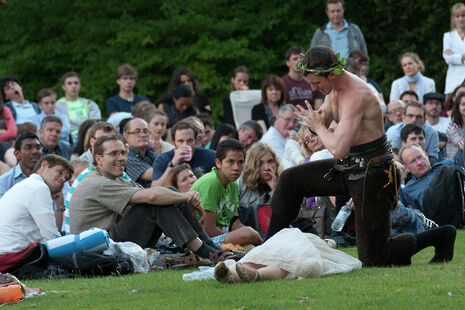Feste at the Festival: The Cambridge Shakespeare Festival
Sarah-Jane Tollan explores the popularity & artistry of the annual festival as it enters its 28th year.

"All the world’s a stage" – or perhaps more appropriately, all of Cambridge, as the annual Cambridge Shakespeare Festival enters its 28th year of adorning college greens with Elizabethan ruffles and breeches. Founded by the Festival Company, headed by artistic director & Oxford University alumnus Dr David Crilly, the Cambridge Shakespeare Festival seeks to stage productions of the Bard’s works that can be relished and appreciated by both learned scholars and novices alike. As a result, the festival is a traditionalist within the world of Shakespearean stagecraft: modern pretences and gimmicks are avoided, creating productions that are Elizabethan in style from the period costume and instrumentals through to the use of natural light.
It is no wonder, then, that the festival has become a calendar event in Cambridgeshire, drawing up to 25,000 visitors into Cambridge’s flourishing college gardens during the months of July and August. The settings are bounteous, with the greenery of Trinity, St. John’s, King’s, and Robinson playing host, whilst the programme is colourful and varied, with the rarely performed Timon of Athens as well as crowd-pleasers such as A Midsummer Night’s Dream and Macbeth forming part of the itinerary for August. Yet, despite potential worries about such plays having been somewhat overperformed, this year’s Romeo & Juliet, performed in the gardens of St John’s College, had Andrew Muir, author of Shakespeare in Cambridge: A Celebration of the Shakespeare Festival, surprised at its ingenuity: "If, like me, you thought you had seen enough of this play, then this production will make you think again."
Indeed, Muir details perhaps the most attractive aspect of the Cambridge Shakespeare Festival: the lighting. Since performances begin at 7:30pm, and conclude at 10pm, the productions begin just before sunset and end in darkness, ensuring that the crew’s use of lighting is creative and symbolic. The power of Juliet’s body lying in a small gauze illuminated from within, as Romeo approaches in the darkness, the light enveloping his body as he draws nearer to tragedy, is startling. As associate director Simon Bell recalls to Muir: "It’s a most fantastic effect; it’s a suffused light that you wouldn’t get of a direct light source. And this beautiful white tent which was glowing with Juliet’s wonder and it just bathed the audience." Additionally, the idea of following Macbeth as he is crowned King of Scotland in the sunlight before the sun sets and the murderous madness takes control will be, needless to say, an experience.
Before satiating themselves on soliloquys and iambic pentameter, ticket holders might choose to savour their surroundings with a picnic – or save themselves for the mulled wine served in the intervals. The Festival Company’s desire to create an environment devoid of the cultural pressure that inhabits most theatres, where families and friends can simply relax and be entertained, is the defining quality of the Cambridge Shakespeare Festival, an event where Shakespeare is not frightening or incomprehensible, and "not of an age, but for all time".
The Cambridge Shakespeare Festival concludes on the 29th August; tickets are available to purchase online or at the door.
"Shakespeare in Cambridge: A Celebration of the Shakespeare Festival" by Andrew Muir is on sale nationwide.
 News / Fitz students face ‘massive invasion of privacy’ over messy rooms23 April 2024
News / Fitz students face ‘massive invasion of privacy’ over messy rooms23 April 2024 News / Cambridge University disables comments following Passover post backlash 24 April 2024
News / Cambridge University disables comments following Passover post backlash 24 April 2024 Comment / Gown vs town? Local investment plans must remember Cambridge is not just a university24 April 2024
Comment / Gown vs town? Local investment plans must remember Cambridge is not just a university24 April 2024 Comment / Does Lucy Cavendish need a billionaire bailout?22 April 2024
Comment / Does Lucy Cavendish need a billionaire bailout?22 April 2024 Interviews / Gender Agenda on building feminist solidarity in Cambridge24 April 2024
Interviews / Gender Agenda on building feminist solidarity in Cambridge24 April 2024





